SPECIAL ACKNOWLEDGEMENTS &
BIOGRAPHIES
To support student learning and to ensure the accuracy and the authenticity of Indigenous Knowledge the following people contributed their time and knowledge to make this project possible:

Isaac Murdoch, Fish Clan, Serpent River First Nation
Isaac Murdoch grew up in the traditional setting of hunting, fishing and trapping. During his many years living off the land, Isaac has learned many of the stories and legends that accompany many of the Sacred Sites and Values placed on Mother Earth and has become a wonderful narrator and advocate for these precious treasures. His many years of experience of conducting ceremonies have helped him maintain a special balance between people and nature and he is known for his advocacy for getting the younger generation in-touch with the land and these Sacred Sites. Isaac has travelled internationally as an advocate and spokesperson and has had the opportunity to meet with people such as Pope John Paul II, Queen Elizabeth & Prince Charles as well as many Canadian dignitaries including Prime Minister Stephen Harper.
Isaac Murdoch grew up in the traditional setting of hunting, fishing and trapping. During his many years living off the land, Isaac has learned many of the stories and legends that accompany many of the Sacred Sites and Values placed on Mother Earth and has become a wonderful narrator and advocate for these precious treasures. His many years of experience of conducting ceremonies have helped him maintain a special balance between people and nature and he is known for his advocacy for getting the younger generation in-touch with the land and these Sacred Sites. Isaac has travelled internationally as an advocate and spokesperson and has had the opportunity to meet with people such as Pope John Paul II, Queen Elizabeth & Prince Charles as well as many Canadian dignitaries including Prime Minister Stephen Harper.

Christi Belcourt, Métis Nation
Christi Belcourt is a Métis visual artist with a deep respect for the traditions and knowledge of her people. The majority of her work explores and celebrates the beauty of the natural world. Author and artist, Christi’s work is found within the permanent collections of the National Gallery of Canada, the Art Gallery of Ontario, Gabriel Dumont Institute, the Indian and Inuit Art Collection, Parliament Hill, the Thunder Bay Art Gallery and Canadian Museum of Civilization, First People’s Hall. Christi is a past recipient of awards from the Canada Council for the Arts, the Ontario Arts Council, the Chalmers Family Fund and the Métis Nation of Ontario. In 2014 she was named Aboriginal Arts Laureate by the Ontario Arts Council and shortlisted for the Premier’s Award. She is currently the lead coordinator for Walking With Our Sisters.
Christi Belcourt is a Métis visual artist with a deep respect for the traditions and knowledge of her people. The majority of her work explores and celebrates the beauty of the natural world. Author and artist, Christi’s work is found within the permanent collections of the National Gallery of Canada, the Art Gallery of Ontario, Gabriel Dumont Institute, the Indian and Inuit Art Collection, Parliament Hill, the Thunder Bay Art Gallery and Canadian Museum of Civilization, First People’s Hall. Christi is a past recipient of awards from the Canada Council for the Arts, the Ontario Arts Council, the Chalmers Family Fund and the Métis Nation of Ontario. In 2014 she was named Aboriginal Arts Laureate by the Ontario Arts Council and shortlisted for the Premier’s Award. She is currently the lead coordinator for Walking With Our Sisters.
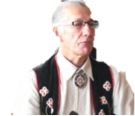
Jerry Otowadjiwan, 4th Degree Mide, Fish Clan, Wikwemikong Unceded First Nation
Jerry Otowadjiwan is a fourth degree Mide, Anishinaabe knowledge holder, teacher, storyteller, singer and Anishinaabemowin language specialist. Embracing a multi-generational, cultural revitalization focus, Jerry’s practice is rooted in his positioning as a Mishomis and chi Mishomis to 7 grandchildren. Jerry’s process also reflects a unique ability to ‘sing worlds into being’ through creatively engaging with protocol, practice and a song’s lineage to protect, support and assist those transitioning. Jerry’s involvement with community rooted organizations has enhanced and re-conceptualized ‘support services’ to include physical, mental, emotional and spiritual dimensions. Laurentian University, University of Sudbury and the Wabnode Centre for Aboriginal Services are just a few of the spaces where Jerry has assisted in cultural revitalization and knowledge sharing. Jerry carries the collective knowledge and memory of place embedded in the singing traditions and protocols of Anishinaabe intelligence. His unique process evokes songs as vehicles to create frequencies of kinship and relationality. This urban methodology assists those who may have experiences dislocation to homeland. Jerry also embodies a strong capacity of translating complex thoughts disseminating from Anishinaabe principles and philosophies.
Jerry Otowadjiwan is a fourth degree Mide, Anishinaabe knowledge holder, teacher, storyteller, singer and Anishinaabemowin language specialist. Embracing a multi-generational, cultural revitalization focus, Jerry’s practice is rooted in his positioning as a Mishomis and chi Mishomis to 7 grandchildren. Jerry’s process also reflects a unique ability to ‘sing worlds into being’ through creatively engaging with protocol, practice and a song’s lineage to protect, support and assist those transitioning. Jerry’s involvement with community rooted organizations has enhanced and re-conceptualized ‘support services’ to include physical, mental, emotional and spiritual dimensions. Laurentian University, University of Sudbury and the Wabnode Centre for Aboriginal Services are just a few of the spaces where Jerry has assisted in cultural revitalization and knowledge sharing. Jerry carries the collective knowledge and memory of place embedded in the singing traditions and protocols of Anishinaabe intelligence. His unique process evokes songs as vehicles to create frequencies of kinship and relationality. This urban methodology assists those who may have experiences dislocation to homeland. Jerry also embodies a strong capacity of translating complex thoughts disseminating from Anishinaabe principles and philosophies.
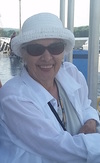
Loraine Whiteduck Liberty, Loon Clan, Nipissing First Nation
Lorraine Whiteduck Liberty, Giimookiikwe is Ojibwa/Algonquin of the loon clan (Mang Dodem). Lorriane is from the N'bissing /North Bay Area. Together with her husband Garry they have raised six children and are now proud grandparents of nine grandchildren. Lorraine works as a Grandmother/Elder in North Bay at Canadore College Campus and has been involved for many years at the North Bay Indian Friendship Centre as a Grandmother/resource person. Lorraine is also a member of the Three Fires Society Midewiwin Lodge. Her best places to be is at ceremonies, in front of her sewing machine and sitting with the grandmothers telling jokes.
Lorraine Whiteduck Liberty, Giimookiikwe is Ojibwa/Algonquin of the loon clan (Mang Dodem). Lorriane is from the N'bissing /North Bay Area. Together with her husband Garry they have raised six children and are now proud grandparents of nine grandchildren. Lorraine works as a Grandmother/Elder in North Bay at Canadore College Campus and has been involved for many years at the North Bay Indian Friendship Centre as a Grandmother/resource person. Lorraine is also a member of the Three Fires Society Midewiwin Lodge. Her best places to be is at ceremonies, in front of her sewing machine and sitting with the grandmothers telling jokes.
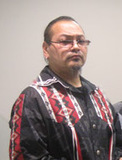
Ray John Jr., Turtle Clan, Oneida Nation
Ray John Jr. has been in the education field for almost 20 years and works as a child and youth worker with high-risk students. A proud father of two boys, Ray uses a value system based on family as the foundation of his speaking engagements in order to help guide people to this beautiful way of life. Through the creation of a personal medicine shield, his message, based on aboriginal culture and teachings, focuses on the importance of establishing balance in all things by demonstrating respect for others, modeling positive leadership qualities amongst peers, being a good role model for younger students as well as looking after each other and our surroundings. His message is expressed in music, dance and classroom discussions to bring an entertaining and meaningful opportunity to reflect on how we treat each other, and how others might be affected by our actions and words.
Ray John Jr. has been in the education field for almost 20 years and works as a child and youth worker with high-risk students. A proud father of two boys, Ray uses a value system based on family as the foundation of his speaking engagements in order to help guide people to this beautiful way of life. Through the creation of a personal medicine shield, his message, based on aboriginal culture and teachings, focuses on the importance of establishing balance in all things by demonstrating respect for others, modeling positive leadership qualities amongst peers, being a good role model for younger students as well as looking after each other and our surroundings. His message is expressed in music, dance and classroom discussions to bring an entertaining and meaningful opportunity to reflect on how we treat each other, and how others might be affected by our actions and words.
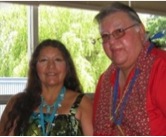
Mary Lou Smoke, Bear Clan, Batchewana First Nation
Mary Lou is a gifted writer, singer, guitarist and traditional drummer. Mary Lou was recently recognized in London, Ont. as a 2013 YMCA Woman of Excellence for her work in education. In addition to their vast traditional knowledge and cultural experience Mary Lou, along with her partner Dan Smoke, are successful television and radio broadcasters, co-producers of Smoke Signals at CHRW Radio 94.9 FM, chrwradio.ca and CTV London. Since 2006, the Smokes have been teaching at Western University for the First Nations Studies Department and the Faculty of Information and Media Studies as well as at Brescia University College since 2009. In 2008, they were awarded the University Students Council of UWO's Teachers of Excellence Award for their teaching methods, which include ceremonial protocols.
Mary Lou is a gifted writer, singer, guitarist and traditional drummer. Mary Lou was recently recognized in London, Ont. as a 2013 YMCA Woman of Excellence for her work in education. In addition to their vast traditional knowledge and cultural experience Mary Lou, along with her partner Dan Smoke, are successful television and radio broadcasters, co-producers of Smoke Signals at CHRW Radio 94.9 FM, chrwradio.ca and CTV London. Since 2006, the Smokes have been teaching at Western University for the First Nations Studies Department and the Faculty of Information and Media Studies as well as at Brescia University College since 2009. In 2008, they were awarded the University Students Council of UWO's Teachers of Excellence Award for their teaching methods, which include ceremonial protocols.
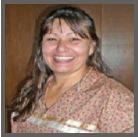
Nancy Rowe, Bear Clan, Mississaugas of New Credit First Nation
Nancy Rowe holds an honors BA in Indigenous Studies and Political Science. She is an educator, consultant and a Traditional Practitioner of Aanishinaabek ways of life, views and customary practices and is currently completing a Master’s degree of Environmental Resource Studies at the University of Waterloo. She is an avid volunteer who co-ordinates Akinomaagaye Gaamik, a grass roots initiative to provide educational opportunities for all peoples interested in Indigenous perspectives of life, health, education, history and the environment. “Education is the doorway through which we all can create a common ground and understanding of not only Indigenous Peoples but also, and more importantly, our environment.”
Nancy Rowe holds an honors BA in Indigenous Studies and Political Science. She is an educator, consultant and a Traditional Practitioner of Aanishinaabek ways of life, views and customary practices and is currently completing a Master’s degree of Environmental Resource Studies at the University of Waterloo. She is an avid volunteer who co-ordinates Akinomaagaye Gaamik, a grass roots initiative to provide educational opportunities for all peoples interested in Indigenous perspectives of life, health, education, history and the environment. “Education is the doorway through which we all can create a common ground and understanding of not only Indigenous Peoples but also, and more importantly, our environment.”

Kelly Crawford, Marten Clan, M’Chigeeng First Nation
Kelly’s love of education and culture has fueled her experience at both the elementary and post-secondary levels. Currently she is a Ph.D. student in Human Studies at Laurentian University and is committed to supporting sustainable solutions that create a re-awakening in education at all levels. Kelly is currently a faculty liaison for the Aboriginal Teacher Education Program at Queen’s University and Instructor/Facilitator at Kenjgewin Teg Educational Institute located on Mnidoo Mnising (Manitoulin Island). Kelly is currently engaged in a variety of curriculum writing projects both locally and provincially. She attributes the connections made to various First Nation communities as being a vital component to her own education.
Kelly’s love of education and culture has fueled her experience at both the elementary and post-secondary levels. Currently she is a Ph.D. student in Human Studies at Laurentian University and is committed to supporting sustainable solutions that create a re-awakening in education at all levels. Kelly is currently a faculty liaison for the Aboriginal Teacher Education Program at Queen’s University and Instructor/Facilitator at Kenjgewin Teg Educational Institute located on Mnidoo Mnising (Manitoulin Island). Kelly is currently engaged in a variety of curriculum writing projects both locally and provincially. She attributes the connections made to various First Nation communities as being a vital component to her own education.
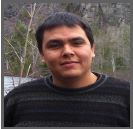
Wesli Day, Fish Clan, Serpent River First Nation
Wesli Day is an Ojibway multi media artist from Serpent River First Nation. Shortly after graduating from Canadore College in North Bay Ontario for Television Broadcasting and Video Production, Wesli’s film, Zombi was entered in the ImagineNATIVE film festival in 2009. In 2010 Wesli completed another project for the Dufferin Peel Catholic District School Board entitled Thunder Mountain, a documentary about students from five different high schools who lived in the bush with several Ojibway Elders. Wesli has also worked at the Oneida Language and Cultural Centre in Oneida Nations of the Thames Settlement helping to restore the Oneida Language and ways of living through various forms of media. Projects ranged from dramatic
films, documentaries and podcasting.
Wesli Day is an Ojibway multi media artist from Serpent River First Nation. Shortly after graduating from Canadore College in North Bay Ontario for Television Broadcasting and Video Production, Wesli’s film, Zombi was entered in the ImagineNATIVE film festival in 2009. In 2010 Wesli completed another project for the Dufferin Peel Catholic District School Board entitled Thunder Mountain, a documentary about students from five different high schools who lived in the bush with several Ojibway Elders. Wesli has also worked at the Oneida Language and Cultural Centre in Oneida Nations of the Thames Settlement helping to restore the Oneida Language and ways of living through various forms of media. Projects ranged from dramatic
films, documentaries and podcasting.
Proudly powered by Weebly